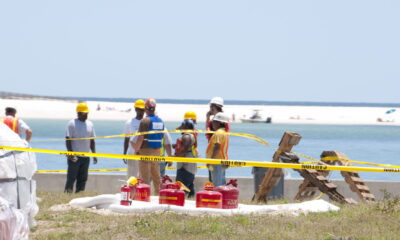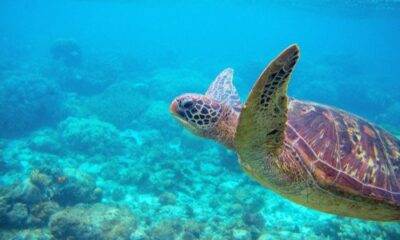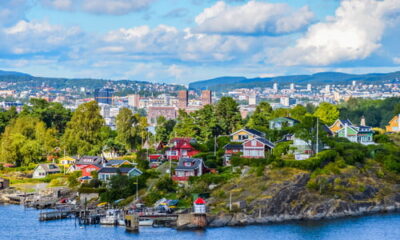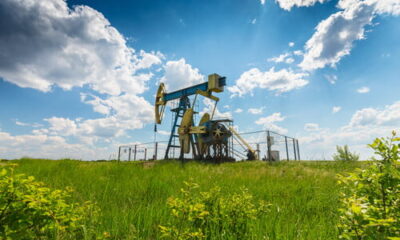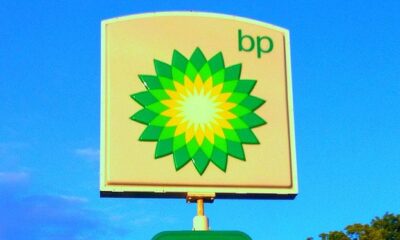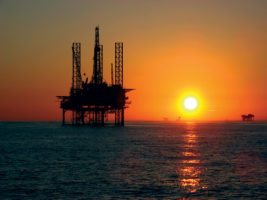

Environment
Outrage at Oil Exploration in Bight
The Wilderness Society are protesting the search for oil in the Great Australian Bight. BP and Norwegian company Statoil, have partnered up to explore the 2000km long open oceanic bay on Australia’s southern coast. The effects of their search could have dire consequences for the Bight.
Australian conservation group the Wilderness Society want to save the Great Australian Bight from oil drilling. Last month they went to BP’s annual general meeting (AGM) to tell BP it has “no right to risk the pristine waters of the Great Australian Bight.” Today they are taking their protest to Statoil’s annual general meeting (AGM) in Stavanger.
Lyndon Schneiders, National Director at the Wilderness Society, said: “This week we’re going to tell Statoil’s shareholders at its AGM that the company is risking their money with a cowboy operator in the Great Australian Bight, and that the opposition to the BP-Statoil joint-venture plans is growing in Australia and around the world. This environmental battle is the southern hemisphere’s equivalent of stopping Shell drilling in the Arctic.
In 2010 BP was responsible for the world’s biggest oil spill accident, the Deepwater Horizon tragedy. For 87 days, 800 million litres of oil was spilt into the Gulf of Mexico. The waters of the Great Australian Bight are deeper, more treacherous and more remote than the Gulf of Mexico.
Mr Schneiders added: “BP’s plan is insanity and poses a grave danger to this pristine marine environment which is home to thousands of whales, dolphins and seals.
“Statoil chief executive Eldar Saetre recently said, ‘I believe that aiming for a low-carbon society is also the most profitable,’ so he could start by ditching its partnership with BP to explore for oil the planet does not need in the pristine waters of the Great Australian Bight.
“BP has already shown it has not learnt anything from its Gulf of Mexico disaster. Australia’s offshore oil and gas authority, NOPSEMA, rejected BP’s first application to drill in the Bight and had said BP needs a comprehensive risk assessment and oil pollution emergency plan.
“The Australian Parliament’s Senate was so concerned about BP’s plans it launched an inquiry, backed by the Labor Party, possibly Australia’s next government after the general election in July.”
An oil spill in the Bight could seriously affect South Australia’s $442 million fishing industry and its tourism industries in coastal regions, worth more than $1 billion. The two industries combined employ more than 10,000 full-time positions.
Peter Owen, South Australia Director at the Wilderness Society, said: “BP has not even released detailed oil spill modelling. It claims an oil spill will last only 35 days even though the Macondo Well spewed billions of litres of oil into the Gulf of Mexico for 87 days.
“Independent modelling shows an oil spill from a deep-water well-blowout in the Bight could affect all of southern Australia’s coast, from Western Australia right across to Victoria through Bass Strait and around Tasmania.”
The Great Australian Bight is a home to a wide variety of marine life. Species including sea lions, seals, Great White sharks, giant cuttlefish and some of Australia’s most important fisheries and seabirds can be found in the Bight.
Peter Owen added: “The Great Australian Bight is a global marine treasure. The Bight’s pristine waters are a haven for 36 species of whales and dolphins, including the world’s most important southern right whale nursery as well as humpback, sperm, blue and beak whales.
“The Bight is littered with state and federal marine parks. One of BP’s leases even takes in a Commonwealth marine reserve.
“The Great Australian Bight is backed by the longest line of sea cliffs in the world, stretching hundreds of kilometres and reaching 60 metres high, the height of a 20-story building, making it even more difficult for any clean-up operations if there was a spill.”
Bunna Lawrie, an elder of the Mirning people, Traditional Owners of the Bight, said: “My ancestors and I have looked after the whale, the land and the sea for 50,000 years.
“We don’t want BP in our sea and our place of the whales. We don’t want pollution causing destruction and poisoning our sea and land. I cannot allow BP to drill for oil in the Great Australian Bight. As a Traditional Owner, I do not want my home, my tradition destroyed and lost forever.”
The MESSAGE energy model shows the world has reserves of 3 trillion barrels, which would create the equivalent of 1250 gigatonnes of carbon dioxide emissions. BP’s 2015 Statistical Review of World Energy says we can only burn 470-1020Gt of CO2 with a 66 per cent chance of staying below 2°C.
Mr Schneiders added: “We don’t need to find any more oil – we have more than enough oil to burn to go over 2°C global temperature rises and runaway global warming.
“Why risk the Bight when we have enough oil reserves and oil prices have plummeted? BP and Statoil are risking billions on an investment that the world can’t use and will become a stranded asset.”


 Environment12 months ago
Environment12 months agoAre Polymer Banknotes: an Eco-Friendly Trend or a Groundswell?

 Features11 months ago
Features11 months agoEco-Friendly Cryptocurrencies: Sustainable Investment Choices

 Features12 months ago
Features12 months agoEco-Friendly Crypto Traders Must Find the Right Exchange

 Energy11 months ago
Energy11 months agoThe Growing Role of Solar Panels in Ireland’s Energy Future
